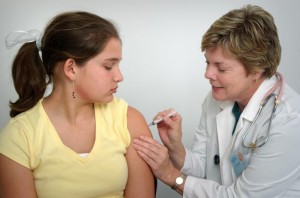 Arizona seems to have escaped the first round of the national measles outbreak without any more cases, but that doesn’t mean we can drop our guard. Measles is still circulating in the country, especially in nearby states. So parents, nurses, doctors and all healthcare professionals need to consider measles as a possibility when someone has a rash and high fever, runny nose, or red, watery eyes. And, of course, children need to continue getting vaccinated.
Arizona seems to have escaped the first round of the national measles outbreak without any more cases, but that doesn’t mean we can drop our guard. Measles is still circulating in the country, especially in nearby states. So parents, nurses, doctors and all healthcare professionals need to consider measles as a possibility when someone has a rash and high fever, runny nose, or red, watery eyes. And, of course, children need to continue getting vaccinated.
According to CDC’s latest report, the Disneyland-associated measles outbreak sickened 142 people in 7 states. We think that the outbreak started with an international traveler or someone who had traveled overseas visited the park while infectious. Measles is contagious up to 4 days before the rash appears; it also lingers in the air and on surfaces after an infected person leaves a room. That makes it one of the most infectious diseases we deal with in public health.
Luckily, there is a way to prevent measles and its spread – vaccination. The MMR vaccine is one of the best vaccines we have – 1 dose is 93% effective and 2 doses are 97% effective. The more people who are vaccinated, the less likely it is for measles to catch hold in a community. To achieve herd immunity for measles in a community, it takes a vaccination rate of about 94.










Can anyone guarantee that the vaccine is manufactured in the United States and not in a third world hell-hole? I’ve read that 92% of the vaccines we take in this country are manufactured in China. Yes, China. The people who brought you lead paint for children’s toys, and industrial silicone give to female breast implant patients. Who in their right mind would inject something into their body that was made in China?
U. S. licensed vaccines and vaccine products are regulated by the U.S. Food and Drug Administration (FDA), which rigorously reviews the product safety, efficacy, purity, and potency. Information about the vaccine regulatory program is available here. On their website, FDA provides information about licensed vaccines, including their safety and availability, ingredients, and recalls. They also provide forums to report adverse events associated with U.S. licensed vaccines.